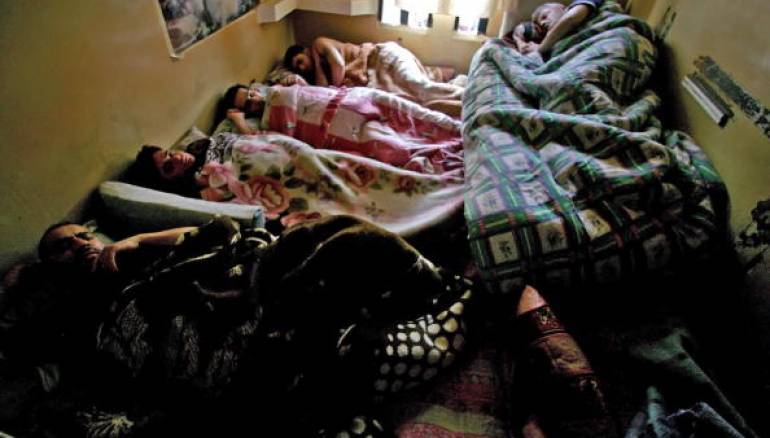Behind the bars of Roumieh, the notorious Lebanese prison, and inside a Cell Block B, dwells Abdul Razzaq al-Adam, a disabled Syrian detainee. He has languished there for more than two years without trial and without an attorney.
Despite his disability, the Lebanese authorities have detained him, a violation of Lebanese law, which exempts such prisoners, who should instead be placed, in the worst cases, in a special care center or in a specialized hospital until trial.
“There are three tragic cases in Roumieh prison of people with mental or physical disabilities, wearing diapers and with no one inquiring about them, including Adam,” said lawyer Mohammad Sablouh, representative of a number of Syrian prisoners in Lebanon.
Faez al-Adam, the detainee’s father, told Zaman Al Wasl that in 2012 his son was on his way to fetch merchandise for the shop in Yarmouk camp where he worked. A shell exploded near him and he suffered paralysis and severe damage to his spinal cord. In the absence of any treatment for his condition in Syria, he was brought by the Lebanese Red Cross to Lebanon in 2013, to be transferred between several treatment centers. Adam underwent a surgical procedure of vertebrae fixation and spinal implants at Chtaura hospital.
Our correspondent reported that a Lebanese intelligence patrol broke into the house he rented in October 2016, confirming that the young man had been subjected to physical and psychological torture and interrogation for many hours without taking into consideration his health condition, which worsened as a result of sitting on a chair for four consecutive days during the interrogation.
He explained that his paralyzed son, “was suffering from paraplegia, lacking sensation in the sensory and motor nerve from his navel to his feet. He pees in bags and cannot tend to himself, in addition to suffering from migraines and chronic pain in his broken back, as well as abdominal and stomach pains.”
A medical report, referred to by Zaman al-Wasl, indicates that Adam has been suffering from paraplegia since 2012 and had a back operation and lumbar implants. He underwent an abdominal surgery four years ago along with treatment for a few other serious injuries.
Our source pointed out that Adam, born in Damascus 1986, was tried five times since his detention without being brought to court or interrogated by the judge. On Jun. 19, 2019, he was transferred to the Military Court in Beirut but was not removed from the car. His trial was for show and for routine purposes; the court is yet to release him.
The source confirmed that Adam, “has become a burden on his cellmates, who feed him and take care of the clothes and diapers and other supplies,” adding that his health deteriorates day after day, slowly dying.
Adam wondered about the role of human rights organizations, the Red Cross and the United Nations and their position on the arrest of a paralyzed person, the reasons behind his arrest and why he has not yet been released.
The prison, considered one of the largest in Lebanon, has more than 7,000 prisoners, although it was designed to hold only 1,500. Its inmates, from politicians and Islamists, live in substandard conditions, are subjected to torture and daily harassment, which led to several strikes in previous years with the aim of improving the conditions of the detainees and speeding up their trials or public amnesty.
This article was edited by The Syrian Observer. Responsibility for the information and views set out in this article lies entirely with the author.


